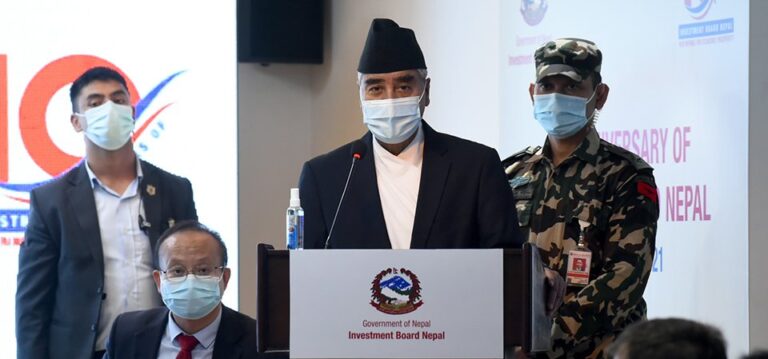
Prime Minister Sher Bahadur Deuba has clarified that the government was ready to create an appropriate environment to bring in foreign investment.
Addressing a programme marking the 10th anniversary of the Investment Board Nepal organised at the Office of the Prime Minister and Council of Ministers, Singha Durbar, today, Prime Minister Deuba called on foreign investors to invest in Nepal.
Pointing out the need for increased investment in national priority sectors in order to achieve sustainable development goals determined by the country, PM Deuba, who is also the chairperson of the Board, shared that the government was committed to creating an investment-friendly environment.
He mentioned that he was hopeful the foreign investment could be brought in by identifying direct investment through the conference, adding that an investment-friendly environment should be created at the collaboration of government bodies and the private sector.
“The country is now focused on economic development after political change”, PM Deuba said, adding that the government has been feeling that large and important national projects should be forwarded based on Public-Private Partnership (PPP) model.
He stressed that such projects could be managed from mutual understanding, stating that there would be necessary support and coordination from the government of Nepal for the same.
Recalling that Nepal is in the process of being upgraded from a least developed country to a developing country, Prime Minister said that Nepal is moving ahead by fully adhering the concept of sustainable development goals for the same.
He expressed the belief that private sector should be mobilized for the development of the country and the conference would play a significant role in it.
PM Deuba also said preparing the environment for investment and rightly utilizing the same were challenging due to the COVID-19 pandemic. However, the government has moved ahead from the policy-wise itself for creating investment-friendly environment.
Stating that several industries were carrying out works through mutual cooperation in spite of the adverse situation, he commended the industries for this.
Finance Minister Janardan Sharma opined that an environment conducive for investment has been made in Nepal and the government was also committed to the same.
Noting that an important base has been prepared in the first decade from the investment perspective, he stressed investment would be required to fulfill the expectations in the next 10 years. He also gave assurances of facilitation in resolving the problems encountered in attracting investment. “Acts and Regulations have been prepared and it is necessary to facilitate their practical implementation. We will pay attention towards that end,” he added.
The Finance Minister also underscored the need of reassuring the investors as they come in through the Board’s doors. He pointed out the need of identifying the problems through assessment in the context of the expected amount of investment not coming in.
Minister Sharma said a great deal of efforts have to be made for synchronizing the people’s aspirations of development with the available means and resources. The Board should give attention to this aspect as well. He stressed linking the citizens with the private and government partnership for facilitating the investment.
The Finance Minister reiterated that the government has encouraged the private sector in bringing in foreign direct investment.
Minister for Energy, Water Resources and Irrigation, PamphaBhusal said that the government had accorded its priority to important projects for the development of Nepal. “The country has the capacity to generate 42,000 MW of electricity and the existing power production is just 1,383 MW.”
As she said, the government plans to generate at least 10,000 MW of electricity by 2030 BS and it has laid its focus on the development of the hydropower sector. According to her, the government sets a target of generating up to 15,000 MW of electricity within the next 10 years.
“Small, medium and large hydropower projects will be operated under the concept of public-private partnership,” the Minister said, adding that a plan to build a solar hydro project in one province was in the offing to generate 2,000two MW of electricity.
Stating that transmission infrastructure was a prime need of the hour for power generation, she said that efforts were underway for the development and expansion of power transmission lines for abroad electricity trade.
Chief Executive Officer of the Investment Board Sushil Bhatta said that the construction works of the 900 MW Arun III Hydropower Project were in progress. “Nepal is an investment-friendly country and several projects being implemented here have the foreign investment.”
He insisted that collective efforts were needed to achieve expected results in the related sector as the Board alone could not do anything.
CEO Bhatta went on to say that the concept of public-private partnership was promoted for the economic development and prosperity of Nepal. He further spoke of the need of escalating the size of public-private investment in big projects with the mobilisaiton of private investment.
As he argued, the country now offers ample opportunities for investment in energy, communication networks, agriculture, tourism, information technology, education and health, construction materials and financial sector.
Source : RSS,






